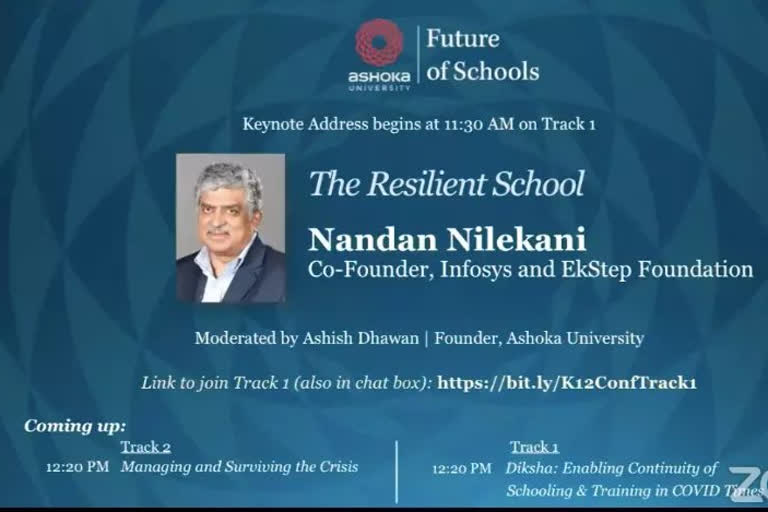New Delhi: Amid the unprecedented attack of COVID-19 pandemic followed by ongoing lockdown, the regular classrooms seems to be a distant possibility as institutions continue to fill the academic gap with online mediums.
However, experts continue to opine that online classes can not be an alternative in the long run and emphasize on need to recreate teaching and learning methods which are accessible to all.
Addressing a virtual conference organised by Ashoka University, the co-founder of Infosys and EkStep Foundation, Nandan Nilekani suggested that Resilient school model for an undisturbed and holistic delivery of education to children. He was delivering key note address on the subject 'Future of Schools: Overcoming COVID-19 challenge and beyond' on Saturday.
"Everyone is struggling to respond to this unprecedented disruption..this is the new reality and therefore when we think about school and education we need to get back to fundamentals and re-imagine it, we will have to revisit the basics and say that classroom is not the only location and teacher is not the only facilitator..We need to involve parents and others being part of it," said Nandan Nilekani.
While appreciating the efforts of teachers and schools for online classes, Nilekani said that the response was necessary in the short term but not sufficient.
"We really have to think strategically on how we are going to deal with this on an ongoing basis for next couple of years" he said.
"A resilient system is something which continues to function even when there is tremendous turbulence outside.. We have to think our education and schools in the same way. How can we re imagine our schools to function effectively while fighting with COVID-19" he added.
While explaining the resilient model Nilekani emphasised on decoupling the schooling from physical schools. He also discussed how the role of teachers would be in the changing times.
"The role of teachers will change because many other things that we think about delivering like content, worksheets and assessments will all get standardised. The teacher will have to deliver empathy, ability to deal with different children with different learning speeds. They will have to be mentoring them, building up confidence and self esteem.. The quality of learning and teaching will also change" he said.
While online learning has emerged as the next best available option in absence of regular classrooms the issue of accessibility remains a challenge. Pointing out the shortcoming, Nilekani pressed on the need that learning should be available to all.
"It shows a need to design a system which is inclusive so that everybody is a part of it and therefore any school at resilient platform has to perform inclusivity. The first requirement of the resilient schools is to virtualize space, schooling should be available anywhere which means just like today working from home has become a standard in so many companies of various sectors we have to think schooling beyond schools. Schools could be delivered at home or in the neighborhood where we have CSCs."
"We need to accept learning beyond the classrooms, it's not about just sitting in the classroom and accessing the teacher.. it's not about proximity. It has to be extended to both the physical and the digital, we have to synchronize teaching and learning experiences" he added.
The resilient school would also require virtualization of time where teachers and students would not be bound by number of hours but they should have to provide anytime access following the system of on demand teaching and on demand learning.
"On demand learning is certainly possible in a self service mode to technology but you need to union it to physical world. Children have access to teachers someway beyond the regular hours, therefore you should make it more flexible and usable" said Nilekani.
The resilient school of the future will have to orchestrate these teaching learning processes to combine with anytime, anywhere synchronous, asynchronous online and still deliver a holistic experience" he said.
To turn the concept of resilient schooling into reality, Nandan Nilekani also emphasised on virtualization of assets like content, learning patterns, worksheets and assessments etc.
"We have to re imagine our content and make sure that it is abundant and affordable because content could be a monopoly or be limited to a few. Therefore content should be available to everyone at high quality and accessible globally. It is very important to de monopolize the quality content" he said.
"Finally we need to have some ecosystems that can rapidly use this data and learn from each other. If there are 50 CBSE schools doing something, it all can get together, try to do experiment and learn from each other. It will recombine teaching learning experiences" he added.
While describing at length about the resilient schooling model, Nilekani appreciated government platforms like Diksha and Vidya Daan. Both the platforms have been quite successful in delivering online content in the times lockdown.
Replying to a question on what government needs to do being the regulator in terms of policies, Nilekani said that government was actually ahead in taking the initiatives.
"DIKSHA is a government initiative and in some sense government is ahead. We need to partner with them and take this even further."
On being asked about the role of IT companies in enabling this happen, Nilekani said that the companies can provide money from the CSR funds, provide content or they can do it through philanthropy.
"They can provide volunteers to go and do technical teaching, many of them are already doing it. Education is very often the first priority of CSR for corporates in India" he concluded.
The session was moderated by Ashish Dhawan, founder of Ashoka University. The university organized a two day virtual conference where leading educationists and global experts talked about managing the crisis, role of technology, up-skilling teachers, adaptive leadership and engaging with parents.
Also read: Hospitals denying admission to COVID patients won't be spared, warns Delhi CM




